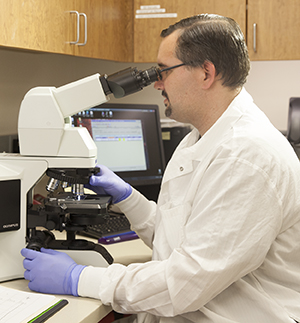Anal Cancer: Diagnosis
Anal Cancer: Diagnosis
How is anal cancer diagnosed?

If your healthcare provider thinks you might have anal cancer, you will need certain exams and tests to be sure. Diagnosing anal cancer starts with your healthcare provider asking you questions. He or she will ask you about your health history, your symptoms, risk factors, and family history of disease.
He or she will also do a physical exam. This includes a digital rectal exam (DRE). During a DRE, your healthcare provider puts a gloved, lubricated finger into your rectum. He or she checks for hard or lumpy areas.
What tests might I need?
During a biopsy, your healthcare provider takes a small sample of tissue from your anus. The tissue is sent to a lab and checked under a microscope.
If your healthcare provider feels anything abnormal or if you have symptoms, he or she may also do tests to check if you have anal cancer. You may need more than 1 of these tests:
-
Anoscopy. For this test, your healthcare provider puts a small lighted tube (anoscope) into your anus to look at the lining. The tube is about 3 to 4 inches long. Your provider will lubricate it before inserting it.
-
Proctoscopy. For this test, your healthcare provider uses a longer lighted tool (proctoscope) to look at the inside of your anus and rectum. It’s about 10 inches long. Again, the tube is lubricated before it is inserted.
-
Biopsy. If your provider sees anything suspicious, you may need a biopsy. During a biopsy, your provider takes a small sample of tissue from your anus. The tissue is sent to a lab. Then it’s checked under a microscope by a pathologist. This is a doctor who specializes in diagnosing diseases by looking at body tissues and fluids. A biopsy is the only way to know for sure if a change seen in the anus is cancer(malignant) or noncancer (benign).
Getting your test results
When your healthcare provider has your biopsy results, he or she will contact you. Your provider will talk with you about other tests you may need if anal cancer is found. Make sure you understand the results and what follow-up you need.
Updated:
June 05, 2019
Reviewed By:
Richard LoCicero MD,Kim Stump-Sutliff RN MSN AOCNS,Lu Cunningham